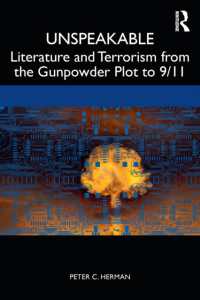- ホーム
- > 洋書
- > 英文書
- > Philosophy
基本説明
Traces the history of mind-body dualism.
Full Description
Traces the history of mind-body dualism.
Lost Souls examines the origins and consequences of the philosophic idea that mind and body are distinct. The author traces mind-body dualism from Plato, Plotinus, Augustine, and Proclus through Descartes and Kant to Nietzsche, Heidegger, Carnap, and Quine. Mind's separation from body has dominated philosophic thinking for millennia, yet most mental activities are now explained in physical terms. What are the implications if mind is material and mortal? Considering both philosophic and scientific ideas about mind, David Weissman explores our options. Rejecting the claim that the character and existence of other things are an effect of the ways we think about or perceive them, he reexamines such topics as meaning and truth, human significance, self, and society. He argues that philosophers have the rare opportunity to renew inquiry by invoking the questions that once directed them: What are we? What is our place in the world? What concerns are appropriate to being here?
Contents
List of Illustrations Acknowledgments
Introduction
Chapter One. Plato's Divided Line
1. The Line
2. The Line's Transmission
A. Plotinus
B. Augustine and Proclus
Chapter Two. Descartes' Revisions of the Line
1. Platonic Themes
A. Knowledge versus Belief
B. Mind-Body Dualism
2. Four Alterations: Descartes Amends Plato's Figure in These Critical Ways
A. Imaginings and Material Particulars Merged as Empirical Differences
B. Forms Replaced by Geometricals
C. The Cogito Substituted for the Good
D. The Line Ensouled
3. The Line Redrawn with Descartes' Emendations
4. The Equivocal Status of God and Space: The Richer and Leaner Theories
5. Skepticism
6. Descartes' Sources
Chapter Three. Consequences
1. Foundationalism
A. Epistemic and Ontological Foundationalsim
B. Mind's Structure
2. Self-knowledge
3. A Priori Intelligibility
4. The Geometrical Character of the Physical
5. The Self-valorizing Ego
6. Descartes' Legacy
A. Existence
B. God
C. Mind as Thinking Substance
D. A Hierarchy of Mutually-Conditioning Orders
E. Which is Prior: Ideas or Percepts?
F. Ideas Construed as Rules
G. Meaning
H. Truth
I. Modalities
J. Will
K. Value
Chapter Four. Descartes' Heirs: Ontological Foundationalism and "The End of Western Metaphysics"
1. Kant
2. Kant in Our Time
A. Romantic Kantians: Nietzsche and Heidegger
B. Analytic Kantians: Carnap and Quine
3. What is Philosophy?
4. Response
Chapter Five. The Cogito's Demise
1. Mind's Reduction to Body
2. Diagnosis: A Philosophical Theory Empirically Refuted
A. What is the Hypothesis Refuted?
B. What Conceptual Features Make Dualism Suspect?
C. What Empirical Evidence Refutes Descartes' Claim?
D. Is the Alleged Refutation a Methodological Error?
3. Consequences of the Refutation
Chapter Six. Churning
1. Disputed Questions
A. Mind's Knowledge of Itself: Introspection, Behaviorism, or Inference?
B. Experience: Schematization and Inspection, or Interaction?
C. Ideas: Innate or Acquired?
D. Meaning
E. Thought
F. Truth: Identity, Coherence or Correspondence?
G. Knowledge: Intuition and Demonstration, or a Network of Hypotheses?
H. Does Mind Prescribe or Investigate the Features of Things?
I. Space and Time: Forms of Intuition or Spacetime?
J. Freestanding Mind, or an Array of Causally-related Bodies or Systems?
K. Freedom or Determinism?
L. Control or Accommodation?
M. Egoism or Sociality?
N. Human Significance
2. An Altered Focus
Chapter Seven. Ideas to Reformulate and Save
1. Intelligibility: Are Thought and Language Autonomous?
2. Mind as Foundational: Culture
3. Self
4. The Good
Afterword
Notes
Index








